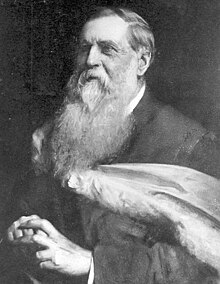|
James Surtees Phillpotts
James Surtees Phillpotts (18 July 1839 – 16 October 1930) was a reforming Headmaster of Bedford School and the author and editor of a number of educational books.[1] BiographyBorn in Cornwall on 18 July 1839, James Surtees Phillpotts was a grandson of Henry Phillpotts, the well known polemicist and Anglican Bishop of Exeter. William Phillpotts, his father, was Archdeacon of Cornwall and vicar of St Gluvias church, Penryn. His mother Louisa Buller was the sister of James Wentworth Buller M.P. and an aunt of General Sir Redvers Henry Buller.[2] James Phillpotts was educated at Winchester College and at New College, Oxford, where, in accordance with the provisions that existed at that time, he was elected a Fellow on going up in 1858.[3] He won the Stanhope Prize in 1859. He passed his Honour Moderations (Mods) in Classics in 1860 and his Literae Humaniores (Greats) in 1862, achieving a first class in both and thus completing his B.A. degree. Thereupon he immediately proceeded to the B.C.L. degree.[4] While at Oxford he won the mile race in the University Sports.[5] In the summer of 1863, with his friends Robertson and Chaytor, he ascended the Jungfrau peak in Switzerland, a notable feat at the time.[6][7] On leaving university he joined the staff of Rugby School where, from 1862 to 1874, he was an Assistant Master under the headmastership of Frederick Temple. In 1875, he was appointed Headmaster of Bedford School. During his period in office he undertook major reform of the school. He retired in 1903. For the remainder of his life he lived at The Ousels, Tunbridge Wells. During his retirement he served as a member of the Education Committee of Bedfordshire County Council. He died in Tunbridge Wells on 16 October 1930. In its obituary The Times described him as "one of the great headmasters of the last century".[8] Headmastership of Bedford SchoolWhen James Surtees Phillpotts took over as headmaster Bedford Grammar School (as it then was) had an indifferent record as an educational institution. There were about 250 boys on roll, most of them day students. With Rugby School as his model, Phillpotts set about reforming the school in every way. One of his first acts was to introduce the Natural Sciences into the curriculum. He saw to the establishment of chemistry and physics laboratories, and went on to add carpentry and engineering workshops, a gymnasium and five courts. Under his leadership sports were properly organized and used as a tool to foster team spirit. In all the changes he introduced Phillpotts' underlying aim was to produce upright, public spirited citizens well equipped for the challenges of the rapidly changing world in which they lived. As a result of the various developments initiated by James Surtees Phillpotts the school ran out of space in its original town centre location. Foreseeing the need to move to more spacious premises Phillpotts secured suitable land on his own initiative. In due course the school trustees backed his plan for new buildings on the new site and arranged the necessary finance. In 1891 the official opening of the new school took place, with a ceremonial procession from the old premises to the new.[9] The roll of pupils was then around 600, and by 1903 when Phillpotts retired it had risen to nearly 900.[10] The development of Bedford Grammar School from an obscure provincial institution to one of England's leading public schools had a significant effect on the economy and size of Bedford town.[11] FamilyIn 1868, while working at Rugby School, James Surtees Phillpotts married Marian Hadfield Cordery, daughter of John Cordery of Weatherall House, Hampstead. She was a sister of Henrietta, wife of Phillpotts' then colleague at Rugby, T.W. Jex-Blake. The couple had seven children, the eldest of whom died in early infancy. Among the remaining six the most notable was Dame Bertha Surtees Phillpotts, the Icelandic scholar. His youngest daughter, Marjory Surtees Phillpotts captained the England Ladies Hockey Team[12] and married William Sealy Gosset.[13][14] Owen Surtees Phillpotts O.B.E. had a distinguished career in the diplomatic service. Lieutenant Colonel Brian Surtees Phillpotts D.S.O., R.E. died a hero's death in the First World War. PersonalityA frank caricature of J.S. Phillpotts' charismatic personality is contained in an article by a former pupil of his which was published in The Pioneer (an Indian journal) in 1903 and was quoted many years later in a Bedford newspaper.[15]
Photographs
Publications
References
External links |
||||||||
Portal di Ensiklopedia Dunia






